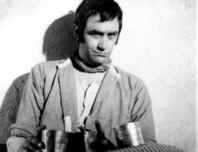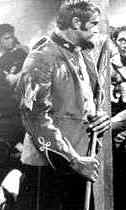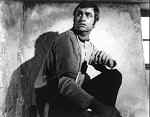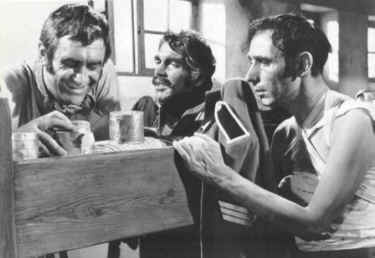

Zulu (1964)
“Dwarfing the mightiest! Towering over the greatest!”
Those adorable taglines accurately describe Zulu’s place in my heart. Maybe it’s not The Best Film Ever Made (whatever that means) but it is without a doubt the one I love most. I’ve seen it so many times I know the whole thing by heart, yet it still has the power to move me.
Zulu tells the true story of the Battle of Rorke’s Drift, a legendary event of little historical consequence but much emotional appeal. A hundred and fifty British soldiers stationed at a hospital/supply dump in 19th century South Africa have just a few hours to prepare for attack by four thousand Zulus. Though fully expecting to be wiped out, like a much larger British force annihilated by Zulus only hours earlier at nearby Isandhlwana, the tiny garrison survives thanks to good planning and fighting so heroic it set a record for the most Victoria Crosses awarded to a regiment in a single action.
The atmosphere of the film is Kipling-meets-Sartre, with a lot of existential questioning and no jingoism. Some of the characters express loyalties or antagonisms based on region, class, rank, and even race, but the movie itself is high-minded and intelligent about such issues and even now, decades later, feels up-to-date politically. Life is absurd, war particularly so, but people are basically decent. Mercy and universal brotherhood are the timeless values that come through, making Zulu an uplifting, inspiring experience.
Zulu's moral beauty is matched by its formal beauty. Filmed on location in Natal in wide-screen Technicolor, it delights the eye with adroit camera work, gorgeous costumes, breathtaking scenery, and perfectly-composed tableaux of battlefield action. The pounding orchestral score by John Barry conveys a sense of struggle and valor. A strong script and brilliant performances all around make us believe in and care about the characters.
Though Zulu stages the battle pretty accurately, it invents most of the story's dramatic details. Memorable moments like the Zulu wedding dance, the battlefield "singing contest," and the final Zulu "salute" are pure fiction. So are the characterizations.
The most controversial invention is "Hookie," the interpretation of Private Alfred Henry Hook as played by James Booth in the film's most thoroughly-developed subplot. A Cockney thief sentenced to military service, who retaliates by malingering and insubordination, Hookie is the film's one rebellious character--an explosive bundle of earthy humor, cynical intelligence, and rage. He fights only reluctantly, but bravely enough to win Britain's highest military decoration, making him the quintessential James Booth character: a heroic antihero and “charming rogue” par excellence. The real Hook was, apparently, nothing like this. His descendants insist (and Zulu War buffs never tire of repeating) that Hook was a model soldier, teetotaler, and family man. But Zulu depicts enough "team players"; Hookie serves as a focus for disaffected, dispossessed, Lumpenproletarian, and freaky sympathies, as well as a vivid, engaging reminder that the locus of value is the individual. He occasions the best performance of James Booth’s career, and is the main reason Booth is remembered today.
Michael Caine has described in his autobiography the experience of arriving to audition for the part of Hookie, only to be told that James Booth had already been cast because "We figured he looked more Cockney than you do." Caine writes, "I knew Jimmy Booth, who was a very good actor and I had to agree, he did look more Cockney than me--very tough indeed." The role of Bromhead was offered to Caine almost as an afterthought. However these casting decisions were made, the outcome is perfect. Caine's gorgeous, snotty Bromhead made him a star, while James Booth--dark, rugged, oozing with masculinity and dangerousness--was obviously born to play the physically demanding part of Hookie. Booth seems strong and fit here and a little more muscular than usual. The uniform in all its manifestations emphasizes his broad shoulders, flat stomach, and long legs. The tufted sideburns, cowlick, and neck scarf flatter his face, as do the dark shadows around his eyes and the deep lines in his brow. No effort is made to pretty him up. He looks fabulous.
In contrast to the film's larger framing story, which takes place in the dazzling, majestic outdoors, the Hookie subplot unfolds inside the cramped, gloomy hospital. We first see Hookie lounging prone in his bunk, playing a shell game with someone and chatting sardonically with someone else. The man in the bunk below Hook's is delirious with fever and begins raving. Hookie shouts, "shut up, you cripple!" and hits the man in the face with a utility belt. Later, in furious exasperation, Hookie shakes the sick man until someone intervenes. When accused of not caring whether the man lives or dies, Hookie callously agrees. Despite this repulsive behavior, Hookie's spirited personality and humorous intelligence give him a strange glamour.
He begins to seem more vulnerable and sympathetic in his next scene. This starts with a wonderful bit of physical business, the clownish parody of a salute with which he greets Surgeon Reynolds, who replies, in dry dismay, "Hook, not you again." Hookie complains of "pretty terrible pain" in his arm. Reynolds demands to examine him at once. Taken aback, but with a great show of suffering, Hookie lifts his undershirt and exposes his back to the surgeon, who says the problem is a boil. Reynolds chatters away about boils but Hookie isn't really listening until Reynolds shows him a scalpel. Chastened and smiling nervously, Hookie asks for some medicinal brandy instead. "Brandy's for heroes, Mr. Hook," the surgeon hisses fiercely, trilling his r's and shoving Hookie back into position against the bunk. "The rest of you will have to make do with boils in your skin, flies in your meat, and dysentery in your bellies. Now...this is going to hurt you a lot more than it will me, I'm happy to say." As he listens to this sadistic little speech Hookie's face darkens with dread. Then Reynolds applies the scalpel, and the scene ends with Hookie wincing and sniveling in pain.
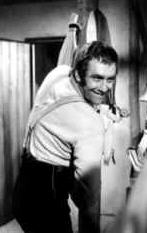
Hookie's third scene is long and informative, key to the subplot and a nonstop tour de force of physical acting on the part of James Booth. It starts with him bursting noisily into the ward while pulling up his pants (with a clear implication of returning from the latrine). When he sees the prudish Miss Witt and realizes he has flashed her, he ostentatiously turns away to fasten his fly, and then creeps up on her in mod-predatory fashion, to greet her gallantly and show off the arc of his chest. Half-jokingly, half-threateningly, he promises to "look after" Maxfield. Miss Witt announces that the patients will all be evacuated soon in the wagons. She's talking to everybody but hardly takes her eyes off Hook. Picking unselfconsciously at a huge hole in his sock, he asks her the crucial question-- "Who says?"--and sneeringly dismisses the whole thing when he finds out the source is her father. It's obvious Margareta wanted to impress Hookie and feels chastened and belittled instead.
At this point another soldier, 612 Williams, arrives in combat gear. He gives Hookie a rifle and tells him they have orders to defend the room together. Hookie objects because he is "sick" and thus "excused duty." (The vitality of his movements at that moment provides a droll irony.) He announces his intention to leave and starts putting on a shirt.
This leads to an intense confrontation with the formerly delirious Sgt. Maxfield, whose tightly-wound, monomaniacal personality emerges for the first time. Hookie responds to Maxfield's abusive, domineering behavior with a mixture of contemptuous hostility and studied indifference. It's clear the two have issues that go back into the past, though these remain unspecified. In any case, Maxfield struggles out of his sickbed, throws the rifle in Hookie's face, and orders him to stay and help Williams, vowing "I'll make a soldier of you yet." Slowly, grudgingly, Hookie returns to his post. Whipping the bayonet out of its scabbard and leaning saucily against his bunk, one arm akimbo, he delivers those memorable lines, "What for? Did I ever see a Zulu walk down the city road? No! So what am I doin' here?" And he tosses the bayonet back onto his bed in disgust.
That's when we learn about Hookie's reputation for theft, and the twenty-eight days of field punishment that Maxfield arranged for him in Brecon. (Field Punishment, also known as crucifixion, is a form of outdoor bondage in which the miscreant is tied to a cross by means of ropes about the forearms and ankles, for two or three hours a day.) Hookie seems to feel that Maxfield is persecuting him, but, with an air of humoring Maxfield, Hookie does what he's told ...until Maxfield, ever dissatisfied, bellows, "And put your tunic on!" Hookie turns round to face him with a look that could peel paint, and at that moment Maxfield faints dead away on the floor.
Bayonet still in hand, Hookie walks over to where Maxfield fell and stands astride his prostrate body. Miss Witt has been watching the confrontation, and now gazes imploringly at Hookie with a look that is half "No! No! No!" and half "Yes! Yes! Yes!"--which brings a hint of a smile to his lips. He puts down the bayonet, hauls the inert Maxfield up from the floor, and looks into his face for a moment...a long, silent moment.
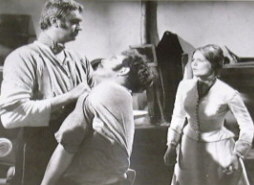
Then he hoists Maxfield over his shoulder and tells Miss Witt a key detail in the story of their feud: during the twenty-eight unpaid days of Hookie's field punishment, Maxfield sent money to Hookie's wife. "What'd you do that for?" Hookie snarls, swatting the unconscious Maxfield on the rump and and carrying him back to bed. The unspoken answer, of course, is that beneath his gruff exterior Maxfield loves Hookie. Miss Witt grasps this immediately. Following Hookie through the room she asks, incredulously, "You hate him for it?" "What do you want me to do?" Hookie replies. "Cry me heart out? Give him a big kiss?" As he talks, Hookie puts Maxfield into bed, kisses him, and grins up at Miss Witt with maddening flippancy. Offended by Hookie's pride and bluff cynicism, confused by his mixed signals, and now ashamed of her own feelings, Miss Witt walks out in a huff, pausing just long enough to reply, "I thought you might pray for him." She shuts the door behind her and Hookie chuckles, "Ah, she's a dry one. Very cool. " Then, giving his bayonet blade a lewd fondle, he adds, "Know what she needs." Miss Witt, eavesdropping outside the door, hears this remark and someone's reply: "Play your cards right, Hookie, it could be you." The men all laugh. Looking ruffled but not really displeased, Miss Witt runs her hand down the doorjamb and walks away.
How do I love this scene? Let me count the ways. I love the comical grossness of the latrine and sock motifs. I love the reference to Hookie's enviable "missus" and the understated but unmistakable signs that Miss Witt is attracted to Hook. And I really love the relationship between Hookie and Maxfield, with its subtle but kinky homoeroticism. I love--make that madly adore--Hookie's jaunty insouciance. Most of all I love James Booth's marvelous physical acting, which does so much to create these effects, to carry the scene and produce its central irony. Though Hook's superiors consider him a coward and scoundrel, he's obviously fearless and much more good than evil. The most satisfying surprise, writes Anna Thomas, is the one that seems inevitable. * Hookie’s spectacular display of heroism, when it finally arrives, feels believable and right precisely because it doesn't come out of the blue, but rather is the fulfillment of our half-conscious expectations.
Hookie initially allows himself to be drawn into the fighting when Williams, who has no authority over Hookie, appeals for his help man-to-man. Hookie responds instantly to this plea after resisting every previous attempt to motivate him. He saves Williams's life with a timely rifle blast and, considering his duty done, decides to abandon his post in the hospital, which soon catches fire. On his way to the exit he sees the outer door giving way under the Zulu assault. He hurries back into the ward, shuts the door behind him, and braces it with a bunk bed and his own body, while directing some other men to dig a hole through the wall to the next room. Hookie holds off the Zulus till the room has been evacuated. He then backs out through the hole in the wall, while Zulus pour into the room after him. He continues to fight while the others escape, and he's about to make his own escape when Maxfield, immobile on the floor, screams for his help. Hookie just sneers at him and keeps going. “I know you,” Maxfield whispers huskily. It's what he said earlier, when he accused Hookie of being "no good." But here it's both an appeal to Hookie's better nature and a remainder of their mysterious prior intimacy. Hookie wavers and again reproaches Maxfield. "What about the money you sent my old woman?" he barks with a scowl. Maxfield just screams “Hook!” And that does it. In one of the more moving moments in the film, Hookie re-enters the burning room.
More Zulus pour in and beset him, but Hookie is an aggressive fighter, always on the offensive. Throughout the defense of the hospital, and especially as he fights his way to Maxfield's side, he seems to have the lethal power of several men. In this Zulu does no more than justice to the historical Hook, who is widely considered the überhero of Rorke's Drift, conspicuously brave even by the high standards of that battle. To underscore his special status, Zulu makes Hookie's combat moves the most picturesque and ferociously driven in the film. His explosive energy, hitherto only hinted at, here achieves frenzied, dionysian release. Booth gives the scene everything he's got and makes Hookie an exhilarating vision of in-the-Zone empowerment and near-invincibility.
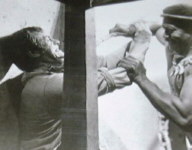
Hookie has lost his gun and is starting to weaken in a struggle over a spear when Williams arrives and saves his life. This would be a great time to get out, but Hookie recovers the spear and continues killing Zulus as if it were an end in itself. He tells Maxfield to stay put and then loses track of him in the melee . Maxfield is still on the floor, in as much danger as ever, chortling away over having finally made a soldier of Hookie, whom he calls “my lad.” He’s happy because Hookie cares enough to save him or die trying . Eventually Williams seizes Hookie by the scruff and drags him toward the exit hole just in time to miss the collapse of the burning roof, which separates Hookie from Maxfield by a wall of flames. Hookie approaches the flames as if to walk through them to rescue Maxfield but the heat is too intense and forces him to back away. He crouches down behind the fire till he disappears, and although he is just crawling through the exit hole, he gives some first-time viewers the disturbing impression that he is being burned alive.
The climax of the Hookie subplot occurs during the celebrated brandy-drinking scene. Though Hookie is amusingly funky earlier (boil, latrine, sock), here he is freighted with extravagant spiritual meaning and glorified almost to apotheosis. Like some pissed-off phoenix reborn from the flames, he’s running for his life through the burning hospital when he passes the cabinet containing the medicinal brandy he wanted earlier--the brandy the surgeon said was "for heroes." He smashes the glass door and takes the bottle. Williams returns and warns him, "That's a flogging offense! Get out for God's sake, man!" Suddenly Hookie turns all sublime and Promethean. Surrounded by leaping flames, his grime-streaked face blazing with power and defiance, his torn red tunic glowing in the firelight, he smashes the bottle open with one blow and very deliberately raises the jagged opening to his lips for a deep, ecstatic draught that leaves him shuddering.
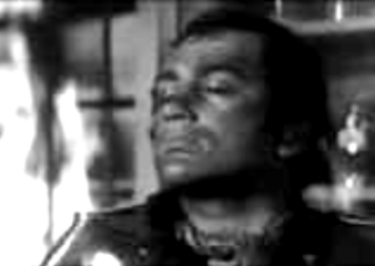
Wow! That scene is so fantastically beautiful it gives me chills to this day. It reminds me of Gericault or Beethoven, with overtones of Nietzsche, Blake, and 19th Century romanticism generally. It suggests that Hookie recognizes the supreme event in his predominantly loser's life, and it also somehow makes him seem magnificently free on the inside, noble and exemplary.
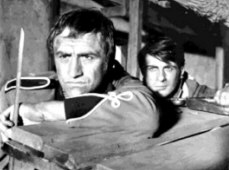
Just in case anybody still doesn't get it, Zulu gives us a couple of glimpses of Hookie standing at the rampart in the darkness, with Williams beside him, watching the hospital burn. "Look at that," Hookie says bleakly. "Do you think he wanted it that way?" He's talking about Maxfield. In other words, way back in the first scene, when he said he wouldn't care if Maxfield were dead, he didn't really mean it. He cares and he feels bad.
But don't break out the violins. Immediately after the battle, Hookie resumes his malingering. He's last seen carving his name in a church pillar and spitting on the floor.

* * * * *
I saw Zulu for the first time in the summer of 1964 at a drive-in. I was eleven. Coming as it did on the eve of my adolescence, the experience changed my life. I was enthralled by the film as a whole and electrified by Hookie, who to me embodied a state of grace and the ultimate in manliness. About halfway through the movie I started shaking, and I couldn't stop. I rode home in the back of the family station wagon trembling with arousal and exaltation. I felt that Zulu wasn't just a great work of art, but something special, something sacred. I stayed awake all night for the first time in my life, drinking vile black coffee and thinking about what I had seen. When dawn broke I went out onto the dewy lawn to look at the sky and became aware of a curious new sensation and the bodily process that caused it. My initiation into womanhood was all mixed up with images of masculine blood, red coats, and the thrusting of bayonets and spears.
* * * * * *
The Battle of Rorke's Drift has been captivating people ever since it occurred. Deemed "immortal" by Queen Victoria, commemorated and celebrated out of all proportion to its negligible geopolitical impact, it seems to stir the imagination and inspire strong emotional reactions.
Zulu was an instant smash hit (in Britain, not America) and has become a television perennial and the chief portal through which people now get sucked into the cult of Rorke's Drift. In fact, the battle and the film are worshipped more or less in tandem. Go to the Internet and try searching on "Rorke's Drift" or Zulu. The links go on forever. Amateur reviews of Zulu posted on www.amazon.com and www.IMDb.com are passionate, filled with superlatives and words like "cherish."
Many aficionados are baby boomers who discovered the film as kids and maintained their enthusiasm into adulthood. (Such is, obviously, the case with me.) Others are career soldiers, military buffs, war gamers, historians, British patriots, and the children of fans (Zulu appeals strongly to kids!). I don't know how big the total market is, but a surprising number of specialized goods and services are aimed at it (see www.eBay.com). These include film memorabilia, videos, CDs, books, comic books, and games; Rorke's Drift "play-sets" complete with miniature hospitals, plastic mealie-bag redoubts, and toy soldiers; Zulu art and artifacts; fine art prints of paintings depicting the battle (there are many, both antique and recent); uniforms and weapons; battlefield relics and tours; battle re-enactments by organizations like The Diehards and the 1879 Group; and several websites devoted wholly or partly to the battle of Rorke's Drift (www.rorkesdriftvc.com, www.rrw.org.uk, www.anglozuluwar.com, and www.kwazulu.co.uk). All of this is completely grassroots in origin and innocent of corporate taint.
Text copyright Diana Blackwell, 2002.
Appendices
Letter from Kevin Workman: "He stole the film"
Link: Pte. Hook's reputation now restored!
Original oil painting of Hookie by Craig Rice
Link: Stanley Baker tribute site
Review: The Pub Landlord's Book of British Common Sense
Link: Monty Python's First Zulu War on Youtube
Link: Zulu voted best war film ever
Link: Homevideos.com reviews Zulu
Link: Stanley Baker tribute website
Link: Hilarious Zulu parody on YouTube
This advertisement for Silk Cut tobacco can be seen at
http://www.youtube.com/watch?v=s6Kc5QQ6Pv8
(If the link doesn't work, go to www.youtube.com and enter "Silk Cut commercial" into the
Search box. The Zulu parody should be the
first option in the resulting list.)
Link: Homoeroticism in Zulu in Cinema Retro online
Link: An appreciative mention of Zulu/Hook
Link: Zulu wins sixth place for "most memorable scene"
ABC Film Annual 1964: "Giant Size"
ABC Film Annual 1964: "The New Heroes"
Link: Sheldon Hall's Zulu reviewed by Christopher Sharrett in Cineaste
Zulu: Theater showing in London and thoughts by Richard Hawley
(The political opinions Hawley expresses are his own, not endorsed by this website.)
Zulu wins third place among best war films
New link:
http://www.genealogyworld.net/azwar/hook.html
A nice statement about James Booth and the ceremony at Hook's grave
Rorke's Drift playsets by Conte
www.britishbattles.com--great section on Battle of Rorke's Drift
Daily Cinema: Pictures from Zulu premier
Publicity materials from Zulu pressbook
Review: Zulu: With Some Guts Behind It
Making-of-Zulu book by Sheldon Hall
The
long-awaited, one-and-only, must-have book for every lover of the movie Zulu
is now available from the publishers.
Sheldon Hall's speech at Hook memorial service
Making-of_Zulu film found in garage!
Zulu Review, Illustrated London News, 2/1/64
Amateur fiction: a modern-day American's fantasy of becoming a 19th century Zulu warrior http://www.mindspring.com/~saverett/zulu.htm
Bruce: The Autobiography by Bruce Forsyth, Pan Books, London, 2002, (ISBN 0 330 48876 7). Black-and-white photograph of James Booth, Stanley Baker, and Bruce Forsythe, all dressed in red tunics, performing a Zulu skit at the Palladium. (Booth has short sideburns, neatly-combed hair, no neck-scarf, so far as I can see, and a harmless expression. He's slightly dishevelled, and holding a rifle, but he's not Hook!)
http://www.mcgonagall-online.org.uk/poems/lpghero.htm A poem and bio about the real
Pte. Henry Hook
http://www.book.co.nz/keegie.htm
Persistent Vegetative State by Alex Keegan
Fiction that lapses into Zulu pastiche, with references to Hook as he was portrayed in
Zulu.
Ken Ferguson interviews James Booth on the set of Zulu.
http://www.brianwaldiss.com/reading/Movies/movies1.htm
Noted science fiction writer Brian W. Aldiss talks to Zulu's director, Cy Endfield.
http://www.bbc.co.uk/wales/walesonair/database/stanley.shtml
Stanley Baker page with videotaped interview clips. Hear Sir Stanley himself talk about finding the backing to make Zulu!
Amateur Fiction:
The
Battle of Rorke's Drift . . .by Randol VV. Hooper
Field
Punishment
Anything for a Quiet Life by Jack Hawkins, Elm Tree Books, Hamish Hamilton, London , 1973
Comic Book: ZULU: Hold or Die!!!
Comic Book: Zulu: Water Cart Rescue by Colin Mathieson, M56 Comics, 8 Stelfox Ave., Timperley, Cheshire, WA15 6UL. Colin@cmathieson.freeserve.co.uk
What's It All About? An Autobiography by Michael Caine, Turtle Bay Books, Random House, New York, 1992 Sir Michael describes the process by which he lost the role of Hook but gained the role of Bromhead in Zulu.
Soldier and the Shaolin by Karl Hegman A soldier and amateur boxer meditates on Hook as an embodiment of principles from Kung Fu.
Pretty Polly Perkins During his delirium, Maxfield sings part of this song . The scene is fiction but the song is real. Here are the complete lyrics.
www.amazon.co.uk Online source for new Region 2 DVD of Zulu. Extras include commentary by film scholar Sheldon Hall and interviews with Lady Ellen Baker and James Booth.
www.dvdreview.net Check out the interview with film scholar Sheldon Hall about the new DVD of Zulu.
http://www.citizencaine.org/ "The web's original Michael Caine site" Want to learn more about the actor who played Bromhead (and who almost played Hook)? This site's dynamite!
Logan and Glitz.com Cult Movie and Television Site (http://www.advsys.co.uk/loganandglitz/links/glitz-linkstar.htm) A cool review of Zulu and much more.
http://www.spartacus.schoolnet.co.uk/Jbutler.htm Lady Butler, a 19th Century woman artist, painted The Battle of Rorke's Drift and other military subjects. Her work is wonderful and she herself seems too cool for words.
Bibliography
Zulu: With Some Guts Behind It--The Making of the Epic Move by Sheldon Hall, Tomahawk Press, Sheffield, England, 2005, ISBN 0-9531926-6-0. [Note: The ultimate book about Zulu, and a fascinating read.]
Monkey Feathers: Defending Zulu (1964) by Sheldon Hall, from "British Historical Cinema ", eds. C. Mark and A. Sargeant, pub. Rutledge, 2002. [Note: A solid refutation of all that nonsense about pro-imperialist and/or racist biases in Zulu, by the leading authority on the film ].
Zulu or the Limits of Liberalism by Christopher Sharrett, Cineaste, vol. XXV, no. 4, 2000, pp. 28-3 [Note: Sharrett gives his reasons for thinking Zulu is pro-colonialist. They aren't very cogent but this article nevertheless contains something cool and unusual: a long, vivid paragraph about Booth-as-Hook showing close observation of the film and some actual feeling for the character. ]
Observations on the film "Zulu" by John McAdam, The Journal of the Anglo-Zulu War Historical Research Assoc. [Note: More than you ever wanted to know about historical inaccuracies in Zulu.]
Mr. Kipling's Army by Byron Farwell, W.W. Norton & Co., NY, 1981, ISBN 0-393-01386-3 [If watching Zulu makes you want to know more about the day-to-day lives of real 19th century British soldiers, then this is your book. Farwell describes everything-- the regiments and ranks, the uniforms, the food and manners and customs. With black-and-white illustrations.]
New Republic, 150:26, JE 20'64
